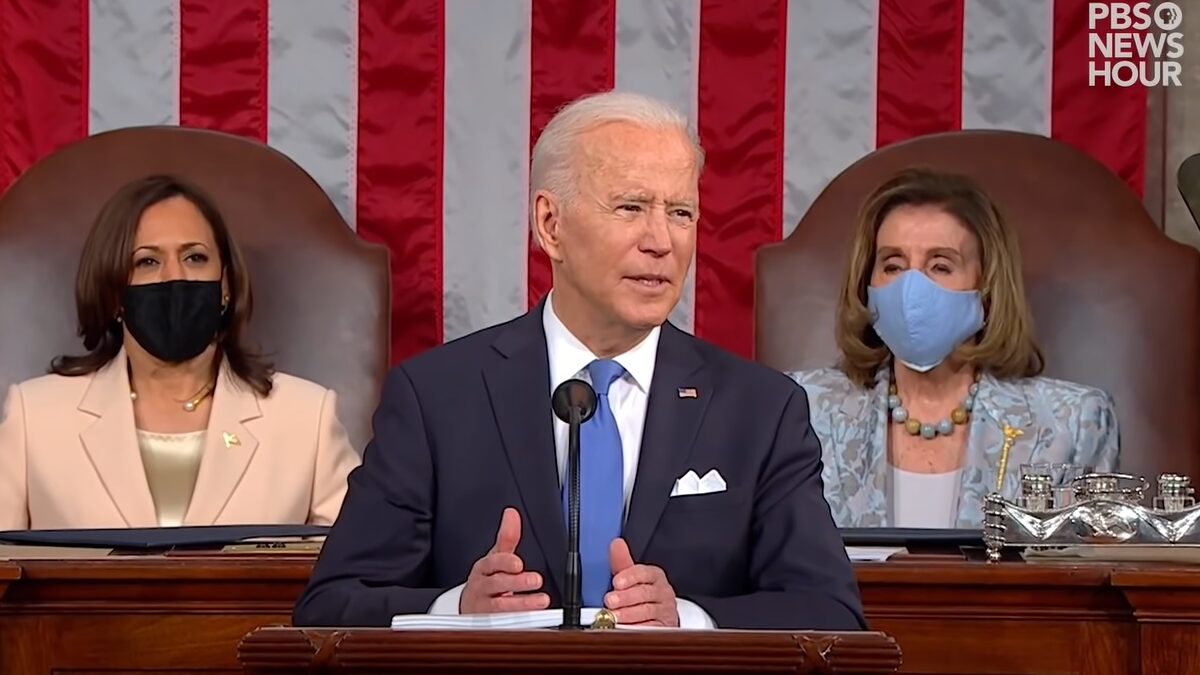In his annual State of the Union Address on Tuesday, President Joe Biden is planning to double down on the “clean” energy agenda that’s limited diplomatic options with Russia.
Showcased in preview materials released by the White House on the eve of the address, the president aims to “call on Congress to deliver on a legislative agenda for clean energy and climate action.”
“Specifically, the President will lift up the benefits we can secure for American consumers, companies, and communities by enacting critical investments and tax credits for domestic clean energy manufacturing and deployment,” the White House wrote. “He will also highlight how the investments and tax credits would cut energy costs for American families an average of $500 per year.”
The White House’s current agenda has already raised power prices to seven-year highs.
Absent from the pre-release, which touts offshore wind, electric vehicles, and costly new regulation, was any mention of the energy independence forfeited by the administration within the last year.
After Biden shut down the Keystone XL Pipeline and suspended oil and gas leases on federal land, the U.S. doubled is imports of Russian oil, according to the Energy Information Administration. The writers at PolitiFact rated the claim “mostly false” despite its own explanation of the score saying the opposite: “The U.S. did double the amount of crude oil imported from Russia last year.”
In December, the U.S. imported more than 400,000 barrels of Russian oil on average daily. The Keystone Pipeline, in contrast, transported 830,000 barrels at peak capacity from the Canadian Tar Sands.
After the president suppressed domestic production, leading to high power prices throughout his tenure, the White House has maintained its refusal to interrupt global energy markets with sanctions on Russian oil and gas, the world’s third-leading oil producers responsible for 11 percent of the world’s supply. In a press call on Monday morning, the White House made that clear.
“We’ll continue to scope out measures to allow for steady energy supplies to global markets,” said a senior administration official, with energy transactions exempt from financial sanctions.
The Energy Information Administration forecasts that this year, the United States will be a net importer of oil — a reversal from a brief stint as a net-exporter when the United States achieved energy independence during the Trump years.
Faced with an electorate antagonized by high gas prices as a consequence of the administration’s animosity toward fossil fuels, Biden will likely only go after the Russian energy sector as a last resort. Doing otherwise in the absence of a radical shift in White House energy strategy would inflict undue harm on American consumers and create a political nightmare beyond the red wave already expected during the November midterms.
The European shift to green energy in the form of wind and solar already gave the continent a crisis last year when it was hit with a low-wind winter. The European Union’s enhanced reliance on Russian natural gas to fill the gaps for instantaneous power generation spell disaster.
According to numbers from the Russian Finance Ministry reported by Reuters, oil and gas revenues generated $119 billion for the Kremlin, some at the courtesy of the American taxpayer, even as Moscow restricted supply to Europe to artificially spike prices and keep European reserves low ahead of its Ukraine invasion.
In the U.S., such a transition to wind and solar has brought rolling blackouts and the failure of the Texas power grid.
Michael Shellenberger, the president of Environmental Progress, explained in a guest post for Bari Weiss’s Substack column on Tuesday how Russian President Vladimir Putin exploited the West’s obsession with “going green.”
“It was the West’s focus on healing the planet with ‘soft energy’ renewables, and moving away from natural gas and nuclear, that allowed Putin to gain a stranglehold over Europe’s energy supply,” Shellenberger wrote.
“As the west fell into a hypnotic trance about healing its relationship with nature, averting climate apocalypse and worshipping a teenager named Greta, Vladimir Putin made his moves. While he expanded nuclear energy at home to Russia could export its precious oil and gas to Europe, Western governments spent their time and energy obsessing over ‘carbon footprints,’ a term created by an advertising firm working for British Petroleum. They banned plastic straws because of a 9-year-old Canadian child’s science homework. They paid for hours of ‘climate anxiety’ therapy.”
Any White House strategy to reclaim energy independence in the near future without unleashing domestic oil and gas production is deeply unserious. Beyond green fantasies, however, the White House has no agenda to reclaim energy independence, empowering the Kremlin to continue financing its war machine on Russian resources.









